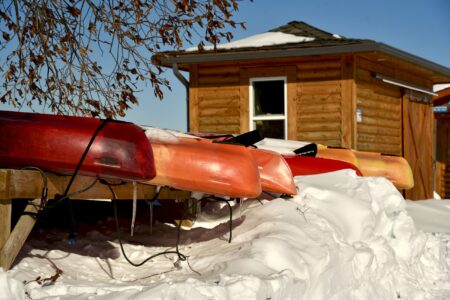Inside: If you are planning to immigrate to Canada as a whole family, Manitoba welcomes you. Apply through the Manitoba Provincial Nominee Program.
By: NChua
April 10, 2010- it was our first international trip as a family. My husband and I, our three boys, aged seven, eight, and eleven. We were excited but sad at the same time, leaving our dear family behind. My boys grew up with their grandparents in the province because I was working in the city and hubby worked overseas.
We would be living as one whole family from then on, isn’t that exciting? I could watch over my boys as they grow up.
Manitoba, here we come!
Join me as I share about our new province here in Canada and tips on how to apply, just like we did.
About Manitoba
Manitoba, the province in Canada located between Ontario and Saskatchewan, has varied landscapes from where it is frozen for much of the year, snow forest, freshwater lakes to prairie grasslands.
It has a continental climate or variation in temperatures, that is, warm summers and cold winters. It is a thriving, centrally located province.
Manitoba’s capital and the 7th most populated municipality in Canada is Winnipeg, where four of the five universities in Manitoba are located. The fifth university is located outside this city. Manitoba has a diverse, or multicultural population with people from all races and cultures.
Did you know that Winnipeg has the largest Filipino population of any major Canadian city? Toronto though, has more Filipinos in absolute numbers.
The majority of Manitobans use English as their language but there are also French-speaking communities and French immersion schools and universities. You might be surprised to know that Tagalog is the second most common mother tongue in Winnipeg.
Not only has Manitoba a diverse culture from over 250 ethno-cultural groups, but it also has one of the strongest and diversified economies, low cost of living and plenty of opportunity for careers or education.
Immigrants to Manitoba

According to the latest census, almost 20 % of Manitobans or people living in Manitoba, are immigrants. They came through different pathways and one of them is by being a provincial nominee.
Each province in Canada has its Provincial Nominee Program (PNP), and in Manitoba, we have the MPNP, or the Manitoba Provincial Nominee Program, that offers immigrants to come as permanent residents of the Province of Manitoba.
Applications are through three “streams” or programs that target certain groups. First is the Skilled Worker stream for internationally trained and experienced skilled workers. Second is the International Education Stream for international students. Lastly is the Business Investor Stream, for qualified business investors and entrepreneurs.
Skilled Worker Stream
In the Skilled Worker Stream, there are two pathways, the Skilled Worker in Manitoba and the Skilled Worker Overseas. In the Skilled Worker Overseas, the applicant must be eligible to apply, that is, establish his/her connection in Manitoba. This is through one, Manitoba Support if the applicant has a family member or friend in Manitoba, two Manitoba Experience if you lived in Manitoba as a temporary foreign worker or international student and third through Manitoba Invitation if the applicant is invited by the province.
Express Entry and Non-Express Entry
When applying to the MPNP, there is an Express Entry and a Non-Express entry application processes to consider.
In the Non-Express Entry process, the applicant will have to meet the eligibility requirements of the nominating province, in this case, Manitoba. Once you are nominated, then the applicant will have to apply for a permanent residence online.
In the Express Entry process there are two ways to apply. One is by contacting the province ( Manitoba ) to apply for a nomination under the Express Entry stream and if the province nominates the applicant, then the applicant will create an Express Entry profile to show that he/she has been nominated. Another is by creating an Express Entry profile to show that the applicant is interested in coming to Manitoba and if the province sends a notification of interest, then the applicant can contact them directly and apply to the Express Entry stream and if nominated the Province of Manitoba will send the applicant a nomination certificate.
How your Points are Calculated
The MPNP will assess the applicants by points assessment. Points are awarded to an applicant depending on five factors.
1. Language Proficiency – the applicant has to submit a valid official language proficiency test. IELTS, the International English Language Testing System is one of the MPNP-approved tests.
2. Age- the highest score of 10 is given to ages 21-45.
3. Work experience- based on the applicant’s documented full-time employment, this should be at least six months and continuous.
4. Education – based on completed education and/or training in recognized educational institutions.
5. Adaptability – with factors of connection to Manitoba like a close relative or friend, or being invited to apply.
It is important to know that live-in caregivers living in Canada or spouses of Canadian citizens or permanent residents, or those who have active application with any other PNP cannot apply to the MPNP.
If the applicant would want to know if their skill and experience in the Philippines or abroad are needed in Manitoba, then they must know the top in-demand occupations in Manitoba. Topping the list are the business, finance and administration occupations. Next is the natural and applied sciences and related occupations and completing the top 3 are health occupations.
There are provinces, like Manitoba who has rural in-demand occupations or the employment is outside of the Manitoba Capital Region. On top of the list are nurse aides, orderlies, and patient service associates. Next, industrial butchers and meat cutters, poultry preparers, and related workers are in-demand occupations, too.
So if the applicant thinks he/she has these skills that Manitoba needs, then consider to apply. If the applicant has work experience outside Canada ( Philippines or anywhere abroad), the applicant needs to indicate he had full-time employment, that is, the skilled worker must have worked at least 30 hours per week for the same employer.
Related post: Canada Expands Express Entry for Skilled Workers
Other Requirements of the MPNP
In the application to immigrate through the MPNP, one will need to pass a medical examination and a police check. The applicant should let MPNP know of his or her commitment to live and work in the province. And if planning to come with the family, the principal applicant is responsible of the accuracy of the documents that will be submitted in the application.
The Canadian Provincial Nominee Programs are always updating their process of application. When we applied through the MPNP 15 years ago, it was different then. Aside from needing workers, the province took into consideration families with young kids to add to their population. The government knew that these young kids would be the future contributors to skilled workers in Manitoba.
Like our “ kababayans,” we became interested in immigrating to Canada. We have relatives in Manitoba and Alberta who encouraged us to come to Canada. Our application as a family of five to the MPNP took two years to process, and I was the principal applicant as it is my relative who is in Manitoba.
After filling out the application form and sending it through my cousin who came home for a vacation, as there was no online application then, we waited for correspondence that our application was received and reviewed. There were calls to our relatives in Canada and mail correspondence to update us about the status of our application, as well questions on the documents submitted.
Watch my interview on our immigration story:
It was both harder and easier then, as we now have online applications and payments and attached documents compared to before when we had to mail bulky documents and do wire transfers for payments. It was easier before because there was no English proficiency language requirement yet.
To the prospective applicants, be connected to the official website of the Government of Canada, to be able to know and be updated on these changes that can happen even during the process of your application. You can check application status and processing times on this site and can add or update information on your application.
This immigration process may sound very hard and confusing, but there are official provincial and government sites to look up as resources to help the applicant on this. Through the IRCC website, you can start to make your online account for the non-express entry process of the MPNP.
Beware!
Be wary of fake agencies, who might pose as very helpful and legit, only to extort money from you.
There are a lot of non-profit groups for immigration consults or pieces of advice that can be searched on the web or on social media platforms. As an applicant, one has to be careful that this is a trusted site or consult group and not one who will just want to use an applicant’s identity and money to scam them. These consultants can give advice on how to go about the process of immigration, which stream to choose, or what nominee program suits them.
The applicant might want to need advice on how to get their credentials assessed, what documents to complete, forms needed, advice on application fees, and biometrics collection, which are important things to ensure acceptance of application to the stream or nominee program of choice.
There are a lot of Filipino consult groups in Canada and what better way to ask for advice, if you do not have family or friends in Canada, particularly Manitoba, if not through them. You could always express yourself better when you talk to a kababayan.
Good luck!
If you have decided or still planning to apply to Canada, Manitoba is one of the best places to go and if you want to come as permanent residents like us, who came with my whole family, try applying through the Manitoba Provincial Nominee Program.
Do your research, ask questions from family and friends who are here and START your journey!
If you want some authentic advise, contact Canada Bound Coaching.
Email at admin@canadaboundcoaching.com
Meet your coaches here.
Photo credit: Vecteezy. com


Hey Marita,
Really interesting the know the process for immigrating to Manitoba. It sounds like a beautiful place in this great big world of ours.
Appreciate that you highlighted the possibility of fake agencies who might attempt to get in on the loop while you’re trying to make your application I wouldn’t have even thought about that, useful point.
Lots of detail and information in this post, thank you for taking the time to list the process and all the pros and cons.
Hi Chezstar,
Manitoba is a beautiful province with lots of natural parks and lakes. Its main city, Winnipeg, is laid back and peaceful, you’re like in a city with less traffic and pollution.
Yes, there are always people who take advantage of others, especially with advancing technology, it’s so easy to deceive others, so beware!
Cheers,
Marita
Interesting article. I thought Canada was a difficult country to immigrate to.
I need to read some other articles on your site as I have a few questions circulating in my mind, probably too many to list here.
However, I don’t quite understand how a province, is doing the work of the Canadian immigration system.
Maybe I have misunderstood something, as I am not familiar with Canadian immigration at all.
I will read some other articles you have on your site just to try an get my head around the working of Canadian immigration.
Hi Michael,
Canada actually is more open now to immigrants and each province has its own programs or streams that applicants can apply to, depending on their qualifications.
You have a choice either to apply first to the province of your choice through the Provincial Nominee Program ( not available in Quebec, though ) or through the Federal Skilled Program, and wait which province will invite you.
Please subscribe to our website so you will always read updates about applying to Canada.
Thanks for reading.
Marita
Many thanks Marita for this comprehensive guide. There is still a lot of research to do for anyone who is seriously planning to immigrate to Canada, but your article definitely serves as a great starting point.
My uncle immigrated to Canada around 10 years ago, and the process was not smooth at all. I’m glad there are articles like yours to facilitate this process for many people.
Thank you for your warning about fake agencies, I’m sure many people are likely to fall into these schemes.
Hi Yusuf,
The applicants these days have the internet at their fingertips to research for all the relevant information, thus, they just need to be aware and do their part to avoid scams.
It is so expensive to apply, but if they get approved, they will eventually be able to repay for all the loans and look forward to a better life.
Manitoba is a great choice.
Good luck!
Marita